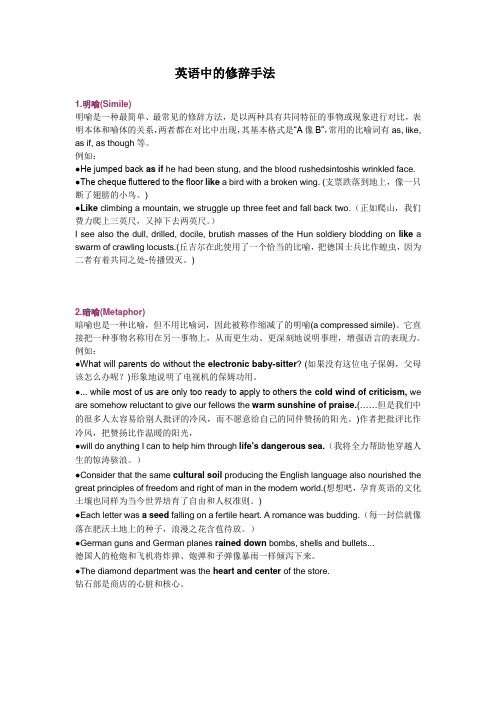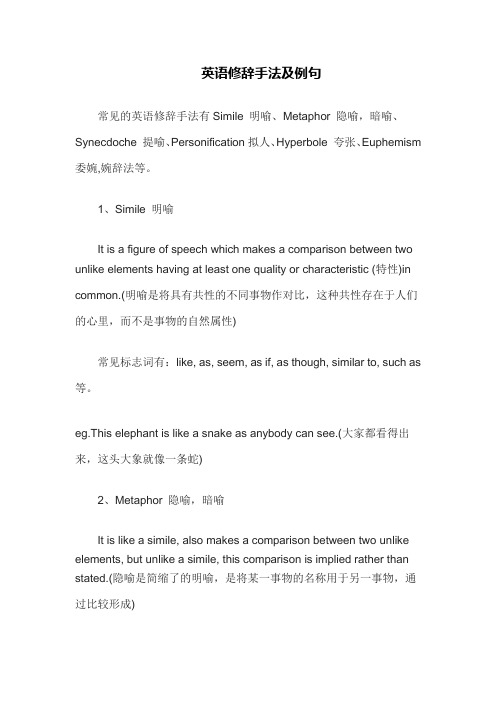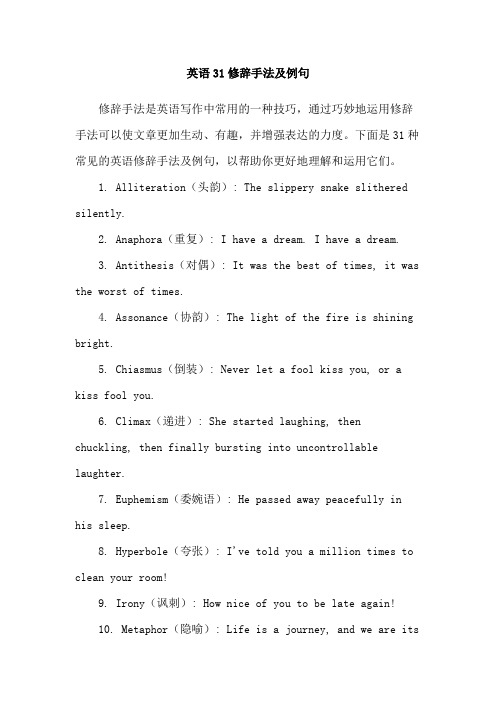英语常见修辞手法
英语常用修辞法22种

英语修辞法18种1. 明喻 (Simile)明喻是指为了鲜明地刻画某一事,将具有某种共同特征的两种事物加以对比。
它由本体、喻体和比喻词组成。
常用的比喻词有as、like、as if、as though、as... as、similar to、to bear a resemblance to等等。
明喻能使深奥的哲理变得浅显易懂。
1.A man without religion is like a horse without a bridle. 人无信仰,犹如马无缰绳。
e a book as a bee does flowers.读书如蜜蜂采蜜。
3.Beauty without virtue is like a rose without scent.美而无德犹如花无香味。
2. 暗喻 (Metaphor)暗喻亦称为“隐喻”,它同明喻一样,也是在两个不同类对象之间进行比喻,区别在于:明喻把本体和喻体说成是相似的,而暗喻则把两者说成是一致的;明喻中有比喻词,而暗喻中不用比喻词。
1.A good book is the best of friends, the same today and forever. 好书如相伴终生的挚友。
2.A dwarf on a giant’s shoulders sees the farther of the two.侏儒站在巨人的肩上,会看得更远。
3.A teacher for a day is a father for a lifetime.一日为师,终身为父。
3.类比 (Analogy)类比是一种阐述事理的修辞格,即用人们熟悉的事例说明较深的道理,或通过具体形象阐明抽象的概念。
它主要是把两种本质上不同的事物之间的共同点加以比较。
1.Judicious praise is to children what the sun is to flowers. 明智的赞扬对于孩子的作用,就像阳光对于花朵的作用一样。
英语修辞手法的例子

英语修辞手法的例子修辞手法是指通过巧妙运用语言的方式,增强表达的艺术效果。
在英语写作中,修辞手法是一种强大的工具,可以使文本更具吸引力、感染力和说服力。
以下是一些常用的英语修辞手法,并且配上了例子,以便更好地理解它们的运用。
1. 比喻(Metaphor):比喻是通过把一个事物比作另一个事物来传达意义和形象化情感的一种修辞手法。
比喻的目的是创造视觉和情感上的联想,使读者更好地理解和感受文本的意义。
例子:- Life is a journey. (人生如旅程)- His words were music to my ears. (他的话音如音乐般妙听)2. 拟人(Personification):拟人是指将无生命的事物赋予人类的特质、行为或意愿,以此增加描写的生动感和表达的深度。
例子:- The wind whispered through the trees. (风在树叶间低语)- The flowers danced in the breeze. (花在微风中跳舞)3. 对比(Contrast):对比通过将两个相反或不同的事物进行对比,以突出它们之间的差异和相互作用,增强文章的对比效果。
例子:- Love is both a rose and a thorn. (爱情既是玫瑰又是刺)- The sunset was a beautiful mix of vibrant colors against the dark horizon. (夕阳把鲜艳的色彩与黑暗的地平线形成了美丽的对比)4. 反复重复(Repetition):反复重复是通过在文章中反复使用相同的词语、短语或句子,以增加其强调和记忆力,使之更加令人难以忘怀。
例子:- Alone, alone, all, all alone, / Alone on a wide wide sea! (《古船上的人》里的反复重复)- I know, I know, I know. (我知道,我知道,我知道)5. 比较(Simile):比较是通过使用"like"或"as"来进行明确的比较,以便更好地理解和描绘事物的特点和属性。
(完整版)英语中的修辞手法

英语中的修辞手法1.明喻(Simile)明喻是一种最简单、最常见的修辞方法,是以两种具有共同特征的事物或现象进行对比,表明本体和喻体的关系,两者都在对比中出现,其基本格式是“A像B”,常用的比喻词有as, like, as if, as though等。
例如:●He jumped back as if he had been stung, and the blood rushedsintoshis wrinkled face.●The cheque fluttered to the floor like a bird with a broken wing. (支票跌落到地上,像一只断了翅膀的小鸟。
)●Like climbing a mountain, we struggle up three feet and fall back two.(正如爬山,我们费力爬上三英尺,又掉下去两英尺。
)I see also the dull, drilled, docile, brutish masses of the Hun soldiery blodding on like a swarm of crawling locusts.(丘吉尔在此使用了一个恰当的比喻,把德国士兵比作蝗虫,因为二者有着共同之处-传播毁灭。
)2.暗喻(Metaphor)暗喻也是一种比喻,但不用比喻词,因此被称作缩减了的明喻(a compressed simile)。
它直接把一种事物名称用在另一事物上,从而更生动、更深刻地说明事理,增强语言的表现力。
例如:●What will parents do without the electronic baby-sitter? (如果没有这位电子保姆,父母该怎么办呢?)形象地说明了电视机的保姆功用。
●... while most of us are only too ready to apply to others the cold wind of criticism, we are somehow reluctant to give our fellows the warm sunshine of praise.(……但是我们中的很多人太容易给别人批评的冷风,而不愿意给自己的同伴赞扬的阳光。
英语中常见的修辞手法

英语中常见的修辞手法英语中常见的修辞手法包括以下几种:1. 比喻:用一个事物来代替另一个事物,以便突出某种特点或形象描绘。
例如:"He is a shining star."2. 暗喻:通过隐晦的方式来暗示某种含义或形象。
例如:"The classroom wasa zoo."3. 拟人:将非人类的事物赋予人类特征,使其更形象生动。
例如:"The wind howled."4. 反问:提出一个问题,但并不期望得到回答,用于强调某种观点或引起读者的思考。
例如:"Isn't it a lovely day?"5. 夸张:夸大事物的特点或程度,以便产生强烈的感觉或效果。
例如:"I've told you a million times."6. 对比:将两个相对的事物或观点进行对比,突出它们的差异或相似之处。
例如:"Love is patient, love is kind."7. 排比:重复使用相同的结构,以便加强表达的力度或效果。
例如:"I came, Isaw, I conquered."8. 修饰语:使用形容词、副词等修饰词语,以增强其描述能力或表达感情色彩。
例如:"The sun was shining brightly."9. 双关语:使用具有多重意义的词语或短语,以产生幽默效果或引起读者的注意。
例如:"Time flies like an arrow; fruit flies like a banana."10. 反复:重复使用相同的词语或短语,以强调某种观点或产生连贯的效果。
例如:"Never, never, never give up."这些修辞手法在语言表达中起到了丰富和强调的作用,并可以提升语言的美感和表达的效果。
英文修辞手法

常见英语修辞手法总共有22种,分别为明喻、转喻、提喻、隐喻、拟人、拟声、夸张、双关、讽刺、联觉、头韵、委婉、修辞反问、隽语、对照、渐进法、渐降法、引用、叠言、仿拟、排比、寓言。
一、明喻(Simile)是以两种具有相同特征的事物和现象进行对比,表明本体和喻体之间的相似关系,两者都在对比中出现。
常用比喻词like, as, as if, as though,seem,similar to, such as等,Eg:1. This elephant is like a snake as anybody can see.这头象和任何人见到的一样像一条蛇。
2. He looked as if he had just stepped out of my book of fairytales and had passed me like a spirit.他看起来好像刚从我的童话书中走出来,像一个幽灵一样从我身边走过。
3. It has long leaves that sway in the wind like slim fingers reaching to touch something.它那长长的叶子在风中摆动,好像伸出纤细的手指去触摸什么东西似的。
二、隐喻(Metaphor)这种比喻不通过比喻词进行,而是直接将用事物当作乙事物来描写,甲乙两事物之间的联系和相似之处是暗含的。
Eg:1、The diamond department was the heart and center of the store. 钻石部是商店的心脏和核心。
2. He is a pig.他简直是头猪。
(比喻:他是一个像猪一般的人,指肮脏,贪吃的人。
)3. She is a woman with a stony heart.她是一个铁石心肠的女人。
(比喻:这个女人冷酷无情。
)4.Mark Twain is a mirror of America.马克吐温是美国的一面镜子。
英语修辞手法及例句

英语修辞手法及例句常见的英语修辞手法有Simile 明喻、Metaphor 隐喻,暗喻、Synecdoche 提喻、Personification拟人、Hyperbole 夸张、Euphemism 委婉,婉辞法等。
1、Simile 明喻It is a figure of speech which makes a comparison between two unlike elements having at least one quality or characteristic (特性)in common.(明喻是将具有共性的不同事物作对比,这种共性存在于人们的心里,而不是事物的自然属性)常见标志词有:like, as, seem, as if, as though, similar to, such as 等。
eg.This elephant is like a snake as anybody can see.(大家都看得出来,这头大象就像一条蛇)2、Metaphor 隐喻,暗喻It is like a simile, also makes a comparison between two unlike elements, but unlike a simile, this comparison is implied rather than stated.(隐喻是简缩了的明喻,是将某一事物的名称用于另一事物,通过比较形成)eg.Hope is a good breakfast, but it is a bad supper.(希望是顿美好的早餐,但却是一顿糟糕的晚餐。
)3 、Synecdoche 提喻It is involves the substitution of the part for the whole, or the whole for the part. (提喻用部分代替全体,或用全体代替部分,或特殊代替一般)eg.The fox goes very well with your cap. (这狐皮围脖与你的帽子很相配。
英语18种重要修辞手法

18种重要修辞手法一、语义修辞1明喻(simile)俗称直喻,是依据比喻和被比喻两种不同事物的相似关系而构成的修辞格。
例如:a figure of speech in which denotes a simmilarility betwe en things of different kinds.1.The snow was like a white blanket drawn over the field.2.He was like a cock who thought the sun had risen to hear him crow.认真观察以上各例,我们会发现它们的特点,由(as)... as, like等引导,这些引导词被称作比喻词(acknowledging word),它们是辨别明喻的最显著的特征,明喻较为直白,比喻物和被比喻物之间相似点较为明显,所以明喻是一种比较好判断的修辞手法。
2暗喻(metaphor)也称隐喻,是依据比喻和被比喻两种不同事物的相似或相关关系而构成的修辞格。
例如:a figure of speech in which refers to sth that denotes literally in order to suggest a similarity.1.His friend has become a thorn in his side.(他的朋友已变成眼中钉肉中刺。
)2.You are your mother’s glass.(你是你母亲的翻版。
)3.Hope is a good breakfast, but it’s a bad supper.由以上各例可知,暗喻没有引导词,这是明喻和暗喻在形式上的最大区别。
换句话说,有为明喻,没有为暗喻。
如:He has a heart of stone. He has a heart like stone.很显然,前句是暗喻,后句是明喻。
英语31修辞手法及例句

英语31修辞手法及例句修辞手法是英语写作中常用的一种技巧,通过巧妙地运用修辞手法可以使文章更加生动、有趣,并增强表达的力度。
下面是31种常见的英语修辞手法及例句,以帮助你更好地理解和运用它们。
1. Alliteration(头韵): The slippery snake slithered silently.2. Anaphora(重复): I have a dream. I have a dream.3. Antithesis(对偶): It was the best of times, it was the worst of times.4. Assonance(协韵): The light of the fire is shining bright.5. Chiasmus(倒装): Never let a fool kiss you, or a kiss fool you.6. Climax(递进): She started laughing, then chuckling, then finally bursting into uncontrollable laughter.7. Euphemism(委婉语): He passed away peacefully in his sleep.8. Hyperbole(夸张): I've told you a million times to clean your room!9. Irony(讽刺): How nice of you to be late again!10. Metaphor(隐喻): Life is a journey, and we are itspassengers.11. Onomatopoeia(拟声): The bees buzzed by my ear.12. Oxymoron(矛盾修饰): The silence was deafening.13. Parallelism(并列结构): She likes cooking, swimming, and reading.14. Personification(拟人): The flowers danced in the wind.15. Pun(双关): I used to be a baker, but I couldn't make enough dough.16. Repetition(重复): I must do it. I will do it. I can do it.17. Rhetorical question(修辞疑问): Who can resist the aroma of freshly baked bread?18. Simile(明喻): Her smile is as bright as the sun.19. Synecdoche(提喻法): The pen is mightier than the sword.20. Allusion(典故): She had a Mona Lisa smile on her face.21. Apostrophe(呼唤): Oh, love, why do you torment me so?22. Consonance(协音): The ship has sailed to the farthest shores.23. Enjambment(跨行): I wandered lonely as a cloudThat floats on high o'er vales and hills.24. Litotes(婉言): She is not unkind.25. Metonymy(转喻): The pen is mightier than the sword.26. Paradox(悖论): The more you know, the more you don't know.27. Periphrasis(迂回说法): The city that never sleeps (New York City).28. Sarcasm(讽刺): Oh, you're so clever, I can hardly stand it.29. Symbolism(象征): The dove represents peace.30. Understatement(轻描淡写): It's just a little cut, no need to make a fuss.31. Zeugma(两义): She lost her keys and her temper.这些修辞手法在英语写作中非常常见,它们可以使文章更加生动有趣,同时也能够增强表达的力度。
- 1、下载文档前请自行甄别文档内容的完整性,平台不提供额外的编辑、内容补充、找答案等附加服务。
- 2、"仅部分预览"的文档,不可在线预览部分如存在完整性等问题,可反馈申请退款(可完整预览的文档不适用该条件!)。
- 3、如文档侵犯您的权益,请联系客服反馈,我们会尽快为您处理(人工客服工作时间:9:00-18:30)。
Metaphor隐喻、暗喻A metaphor is a literary figure of speech that uses an image, story or tangible thing to represent a less tangible thing or some intangible quality or idea; e.g., "Her eyes were glistening jewels". Metaphors are comparisons that show how two things that are not alike in most are similar in one important way. A metaphor is more forceful (active) than an analogy, because metaphor asserts two things are the same, whereas analogy implies a difference;A…B with signal words of:Like, not unlike, as, as if, as it were, may be compared to, similar to…——simile(明喻)A…B with signal words of:Be(is), or no signal words——metaphorsynecdoche 即提喻提喻大致归纳为四种情况:a.部分和全体互代;b.以材料代替事物;c.抽象和具体互代;d.以个体代替整个类。
1.Outside,(there is) a sea of faces.外面街上,是人的海洋。
(以人体的局部代全体,即以faces 表示people)2.Have you any coppers?你有钱吗?(以材料代事物,即以copper铜喻指coin money铜币)3.They share the same roof.他们住在一起。
(以部分代全体,即roo屋顶,表示house 屋子、住宅)递升法(Climax)运用这种修辞手法,能够使要表达的思想加深,感情逐步强化,因而能够增强语言的说服力和感染力1、以程度的深浅,语意的轻重的顺序来排列语句I am sorry, I am so very sorry, I am so extremely sorry. I admire her, I love her, I need her.When we heard the good news, we clapped their hands, sang and danced and jumped for joy.2、以范围的大小顺序来排列语句He wanted to educate his children, serve this country, and satisfy his God.He gazed upon the pretty houses, green hills and the broad Pacific.3、以时间的先后顺序来排列语句They came, they played, they conquered.The prisoner was first questioned, then tortured, and finally shot.Synesis单词的搭配符合逻辑,但不符合语法,比如例句中的anyone 和them。
If anyone calls, tell them I am out.Litotes(曲意)利用否定的形式,表达肯定的意思,比如例句中的not healthy 相当于dangerous.War is not healthy for children and other living things.Alliteration(押头韵)一组单词的第一个辅音相同,比如例句中四个以L开头的单词。
Let us go forth to lead the land we love.Metonymy(换喻)用一个单词代替另外一个在概念上有关联的单词,比如例句中的sword,用来代替war。
The pen is mightier than the sword.Paradox(佯谬)似是而非、或者似非而是的表达,比如例句中关于youth的看法。
What a pity that youth must be wasted on the young.Parallelism(排比)由三个或三个以上结构相同或相似、内容相关、证据一致的短语或句子排列在一起,用来加强语势强调内容,加重感情的修辞方式。
Examples:1.parallelism of words:She tried to make her pastry fluffy, sweet, and delicate.parallelism of phrases:Singing a song or writing a poem is joyous.2.parallelism of clauses:Perch are inexpensive; cod are cheap; trout are abundant; but salmon are best.Zeugma(轭式搭配)用一个形容词修饰两个名词,其中一个修饰是通顺的,另外一个修饰则是勉强的,比如”他接受我的建议和钱包”例: He lost his coat and his temper.(他丢了上衣,发了脾气。
)上例中,动词"lost"支配"his coat"和"his temper",但是"lost"和"his coat"搭配时是“丢”的意思,和"his temper"搭配时就不是,这就是配对不当的情况。
Metanoia (自我更正)Assonance(协音)重复某个发音相同或相似的音节,比如例句中的Thy/thy和-dom/done.Thy kingdom come, thy will be done.Onomatopoeia(拟声)模拟自然界的各种声音,比如例句中的ticktacking.I hear the clock ticktacking, and time goes by.EpithetAn epithet is an adjective, especially of praise or blame of a person. it differs from grammatical modifiers because it emphasizes rhetorical effect. Sometimes an epithet has no meaning at all, only creating a rhetorical effect. Therefore, it is called a transferred epithet with shifts from its proper subject to some allied circumstance.例:even at this tortured moment he could just feel the extraordinary nature of the bargain he had made.Personification(拟人)用人的特性来描述人以外的事物,比如例句中的England.England expects every man to do his duty.Antithesis(对偶)两个或多个句子,结构相同,但含义相反,或者含义形成对比,比如例句中的is no vice 和 is no virtueExtremism in the defense of liberty is no vice, moderation in the pursuit of justice is no virtue.Asyndeton连接词省略省略单词、短语或从句之间的连接词,比如例句中省略了两个连接词and。
But, in a larger sense, we cannot dedicate, we cannot consecrate, we cannot hallow this ground.Analogy(类比)A special form of comparison, showing similarities between essentially unlike things, things belonging to totally different classes.Eg.girls and flowersAporia(假装疑问)假装表示疑问,做出对某件事情好像不太肯定的样子Then the steward said within himself,“what shall I do?”Hyperbole(夸张)Cacophony(杂音)使用一组发音不和谐的单词,以便让人听着不舒服,比如例句中的一组单词We want no parlay with you and your grisly gang who work your wicked will.Euphemism(委婉)用礼貌、非冒犯性的表达,代替不礼貌、冒犯性的表达,比如例句中的passed away 和went to be with the lord.Charles shively,94, passed away and went to with the Lord on April 22, 2004, from natural causes.Euphony(谐音)Apostrophe(顿呼)在叙述过程中,突然对不在场的第三人(或拟人化的抽象事物)的称呼,不如例句中的o you godsJudge, o you gods, how dearly Caesar loved him.Oxymoron(矛盾修饰)使用两个或多个自相矛盾的单词,比如例句中的cruel 和 kind.I must be cruel only to be kind.Irony(反语)字面意思与说话人实际想表达的意思不一致,通常用来讽刺,比如例句中的an honourable manYet brutus says he was ambitious, and brutus is an honourable man.。
